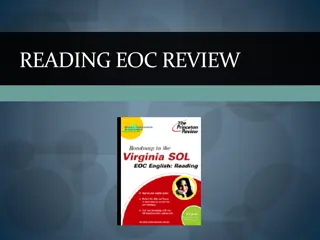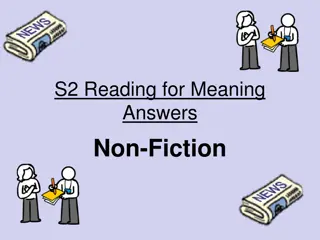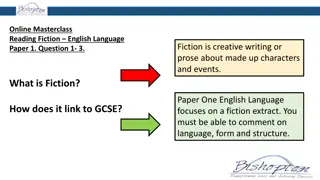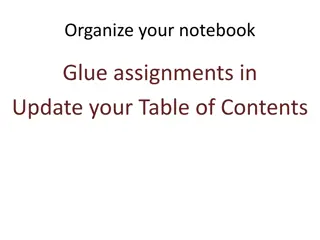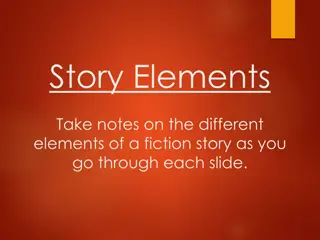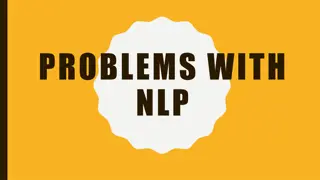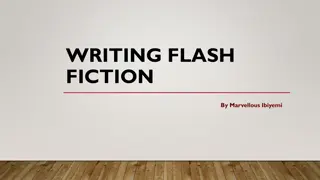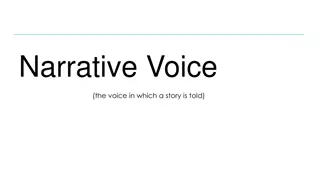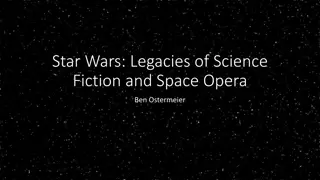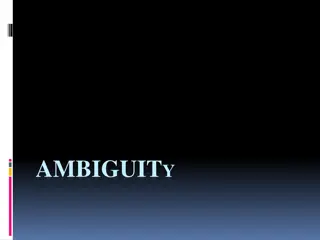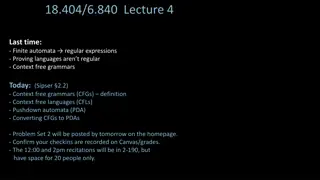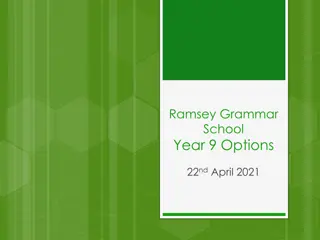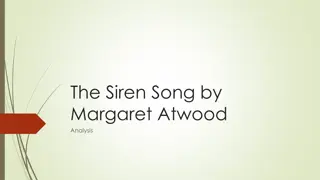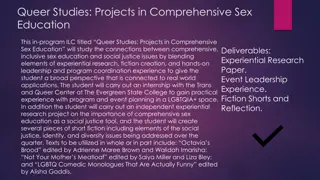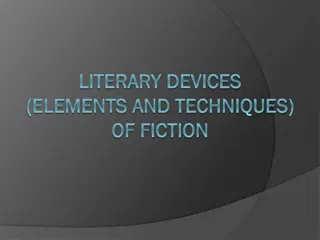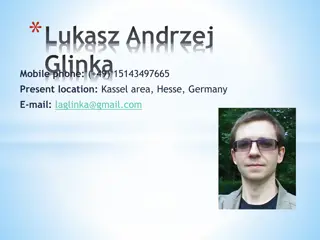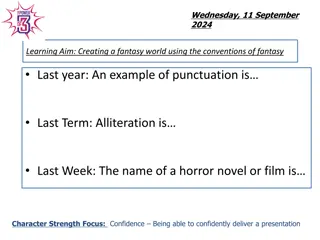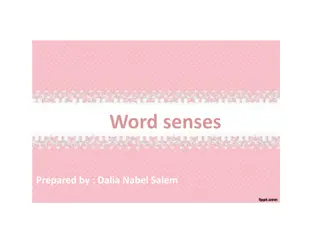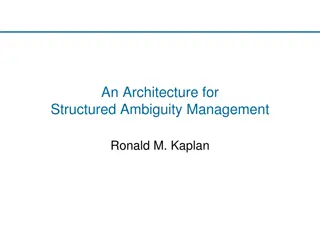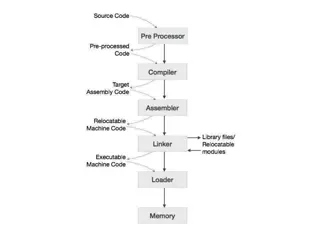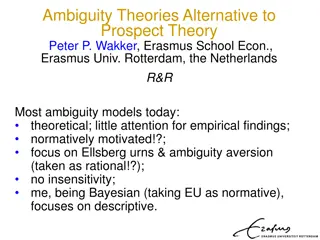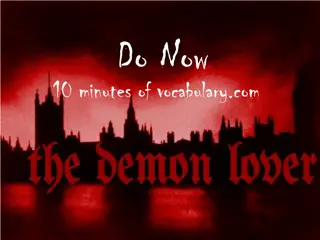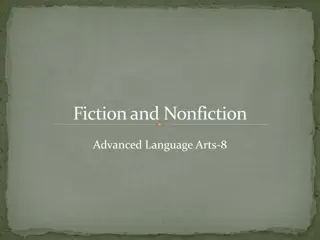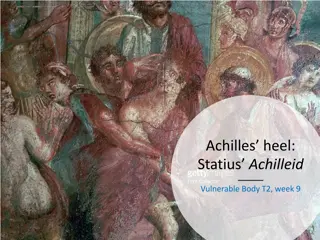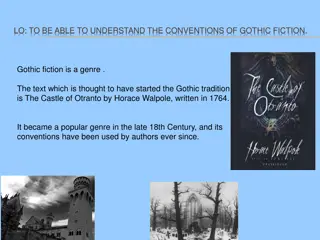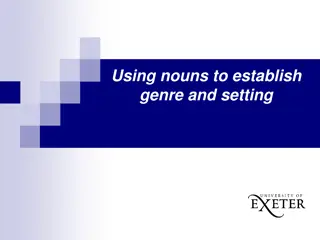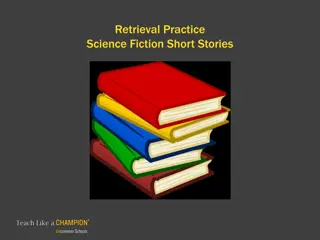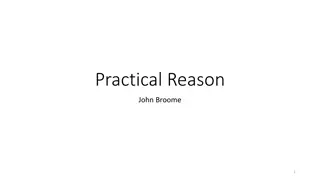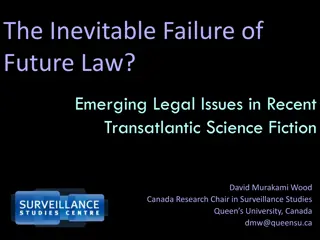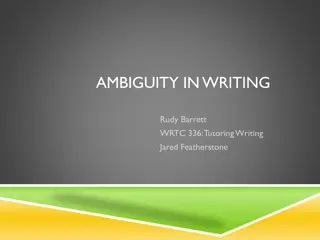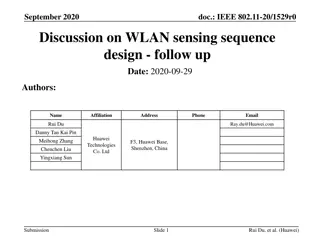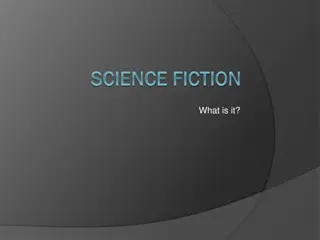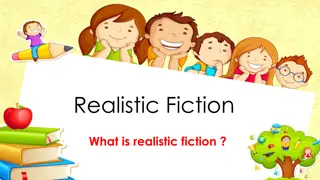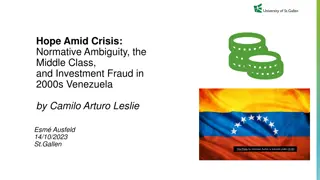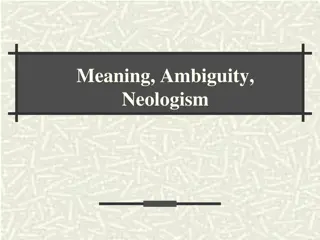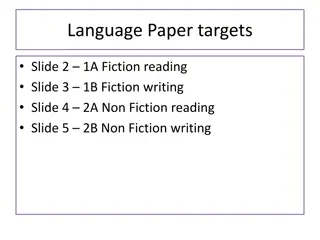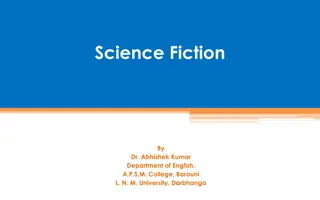Exploring Citizen Journalism and Non-Fiction Writing
Explore the world of citizen journalism and non-fiction writing, learning about text types, adapting writing to conventions, considering audience, purpose, and tone. Discover the significance and usefulness of non-fiction writing, and delve into creating various text types. Uncover the role of citiz
1 views • 11 slides
Reading EOC Review: Test Structure, Types of Selections, and Breakdown
The Reading EOC Review covers the test makeup, types of reading selections, and breakdown of questions and content to help you prepare effectively. The test comprises sections with 55 scored questions to be answered, focusing on functional literacy and narrative/fiction elements, including poetry, p
8 views • 26 slides
Exploring Contemporary Non-Fiction Themes
Delve into diverse non-fiction topics such as pet pampering, societal contradictions in teen reading habits, environmental concerns like plastic pollution, and societal opinions on education and lifestyle choices. Discover intriguing discussions and thought-provoking insights in this engaging collec
0 views • 55 slides
Understanding Fiction Through Text Analysis: Paper 1 English Language Masterclass
Delve into the world of fiction through an analysis of the novel "Girl With a Pearl Earring". Explore how language, form, and structure are used in the extract to captivate readers. Discover the characters, setting, and narrative techniques employed by the writer to engage and intrigue readers. Unco
1 views • 7 slides
Exploring Historical Fiction: Elements and Examples
Discover the essence of historical fiction, its key elements, and examples like "Forrest Gump." Learn how plausibility and interpretation play pivotal roles in creating captivating narratives that blend fiction with historical events.
0 views • 11 slides
Spring 2015 English 110 Final Exam Information
Spring 2015 English 110 Final Exam includes an Essay Final Exam to be completed by May 21st and an Objective Final Exam on May 27th or May 28th. The Essay Final consists of flash fiction tasks, literary criticisms, and analysis, while the Objective Final covers fiction elements identification and an
0 views • 7 slides
Essential Elements of Fiction Storytelling
Dive into the key components that make up a compelling fiction story, including plot development, setting, mood creation, character conflicts, and the use of imagery and dialogue to enhance the reader's experience. Explore these foundational elements to enhance your storytelling skills.
1 views • 36 slides
Understanding Ambiguity in Natural Language Processing (NLP)
Natural Language Processing (NLP) faces challenges with ambiguity, which occurs due to multiple possible interpretations of language input. Humans can often resolve ambiguity, but it's complex for computers. Types of ambiguities include lexical, syntactic, pragmatic, referential, and transient. Over
2 views • 24 slides
Crafting Compelling Flash Fiction: Techniques and Examples
Dive into the world of flash fiction with this informative piece detailing the essence, types, and techniques of writing succinct yet gripping stories. Learn how to hook readers from the start, use impactful scenes over summaries, and create lasting impressions with minimal words.
0 views • 18 slides
Understanding Narrative Voice in Fiction Writing
Explore the elements of narrative voice in fiction writing, including tense, perspective, and language choices. Learn how authors decide on the tense and perspective for their stories, and consider different language styles that suit various characters and perspectives. Discover the nuances of first
1 views • 7 slides
Influential Works in Science Fiction and Space Opera Literature
Explore the significant influence of classic science fiction novels like "War of the Worlds," "A Fighting Man of Mars," "Second Foundation," "2001: A Space Odyssey," and "Children of Dune" on the creation of iconic space opera narratives such as Star Wars. Delve into the themes, settings, and charac
0 views • 16 slides
Understanding Ambiguity in English Language
Exploring the concept of ambiguity in the English language, this article delves into the various meanings words can convey, the challenges of ambiguity resolution, and the types of ambiguity such as lexical and structural ambiguity. Examples of homonymy and homophony are provided to illustrate how w
2 views • 27 slides
Understanding Context-Free Grammars (CFGs) and Pushdown Automata
Exploring Context-Free Grammars (CFGs) and Pushdown Automata, covering definitions, examples, ambiguity, and conversions. Learn about generating strings, CFG formal definitions, ambiguity in grammars, and more. Connect with the basics of context-free languages and their relations to PDAs. Dive into
0 views • 13 slides
English Language Cambridge IGCSE Course Overview
Students of the Ramsey Grammar School Year 9 English Language Cambridge IGCSE course will engage in reading and analyzing various fiction and non-fiction texts, honing comprehension skills, crafting written pieces with clarity and purpose, and enhancing their ability to summarize and re-imagine cont
1 views • 7 slides
Margaret Atwood's Analysis of "The Siren Song
Margaret Atwood, a renowned Canadian author, delves into the plight of humans through speculative fiction with elements of dystopia and science-fiction. She is an environmentalist who addresses issues like global warming in her works. Atwood's writing style includes free verse poetry with enjambment
16 views • 18 slides
Exploring Comprehensive Sex Education and Social Justice Connections
This program, "Queer Studies: Projects in Comprehensive Sex Education," delves into the intersection of inclusive sex education and social justice issues through experiential research, fiction creation, and hands-on leadership experiences. The student will intern at the Trans and Queer Center, condu
1 views • 6 slides
Explore Literary Devices and Elements of Fiction
Dive into the world of literary devices and elements of fiction, including setting, mood, plot, flashback, and foreshadowing. Understand how sensory details enhance writing and learn about techniques such as allusion, figurative language, and more. Discover the significance of these elements in shap
1 views • 28 slides
Lukasz Andrzej Glinka - Non-fiction Writer and Science Author with a Diverse Academic Background
Lukasz Andrzej Glinka is a prolific non-fiction writer and science author known for his extensive publication record, academic achievements, and editorial contributions. With a background in theoretical physics and a wealth of experience at prestigious research institutions worldwide, he has establi
0 views • 6 slides
Exploring Fantasy Worlds: Conventions, Types, and Challenges
Dive into the realm of fantasy literature and learn about the conventions, types, and differences between fantasy and sci-fi. Uncover the definition of fantasy, explore popular genres, and discover sub-genres like fiction, science fiction, and historical fiction. Engage in thought-provoking challeng
0 views • 17 slides
Understanding Polysemy and Homonymy in Lexical Ambiguity
In lexical ambiguity, polysemy refers to one word having multiple related senses, while homonymy involves different words that sound the same but have unrelated meanings. Distinguishing between polysemy and homonymy can be challenging, but certain guidelines can help differentiate them based on shar
0 views • 27 slides
Managing Ambiguity in Language: An Innovative Approach
Language presents challenges due to its inherent ambiguity, making it difficult to map between form and meaning. This content discusses an architecture for structured ambiguity management, emphasizing the complexities of linguistic interpretation, modular mapping from text to meaning, and the pervas
0 views • 31 slides
Washington Irving: Father of American Fiction and Pioneer of American Romanticism
Washington Irving, an influential American author of the early 19th century, is revered as the Father of American fiction. Known for iconic works like "The Legend of Sleepy Hollow" and "Rip Van Winkle," Irving played a crucial role in establishing American literature as an independent art form. His
1 views • 14 slides
Understanding Issues in Context-Free Grammar: Ambiguity, Precedence, Associativity, and More
Delve into the complexities of context-free grammar, exploring concepts such as ambiguity, precedence, associativity, left recursion, and left factoring. Learn about the challenges posed by left recursion and the differences between ambiguous and unambiguous, as well as deterministic and non-determi
0 views • 7 slides
Ambiguity Theories as Alternatives to Prospect Theory
This article explores ambiguity theories as alternatives to Prospect Theory, focusing on decision-making under uncertainty. It discusses the Anscombe-Aumann framework, multiple priors models, and applications of ambiguity models. The popular Anscombe-Aumann framework is detailed, with a two-stage ap
0 views • 29 slides
Exploring Ambiguity in "The Demon Lover" by Elizabeth Bowen
Analyze the ambiguously written short story "The Demon Lover" by Elizabeth Bowen to understand the deliberate presentation of confusing aspects in fiction. Delve into the author's background and wartime experiences during WWII to gain insight into the thematic elements of grief, displeasure, and los
0 views • 13 slides
Understanding Fiction and Nonfiction in Language Arts
Fiction and nonfiction are two key genres in literature. Fiction involves imaginative storytelling with elements like plot, characters, setting, point of view, and theme. Nonfiction, on the other hand, deals with real people, events, and ideas, aiming to inform, persuade, or entertain readers. Explo
0 views • 14 slides
The Complex Themes of Vulnerability and Ambiguity in Statius's Achilleid
Exploring the intricate narrative of Statius's Achilleid, this analysis delves into the vulnerability of Achilles and Thetis's attempts to mitigate it, challenging the traditional epic genre through hybridity and ambiguity. The thematic interplay of divine-human dynamics, gender ambiguity, and the c
0 views • 14 slides
Understanding Gothic Fiction Conventions in Literature
Gothic fiction is a captivating genre rooted in dark, mysterious settings, supernatural elements, and eerie atmospheres. Originating with "The Castle of Otranto" by Horace Walpole, this genre has evolved to encompass elements like family curses, isolated castles, and sinister creatures. Dive into th
0 views • 25 slides
Creative Noun Usage in Science Fiction Writing
Explore the art of using nouns to establish genre, setting, and character names in science fiction writing. Learn how authors like Philip Reeve utilize proper nouns to create immersive worlds and unique characters. Delve into the significance of authentic text, discussion, and purposeful learning pr
0 views • 10 slides
Science Fiction Retrieval Practice: Short Stories Insights
Explore futuristic technologies, incongruity, and speculative fiction elements in science fiction short stories like "Robbie" and "There Will Come Soft Rains." Uncover the connections to historical events, like the Cold War, through literary analysis of these captivating narratives.
0 views • 16 slides
Exploring the Ambiguity of Reason in Philosophy Through Historical Perspectives
The ambiguity and complexity surrounding the concept of reason are delved into through the historical lenses of John Broome and David Hume. From the early uses of "reason" in English to its normative implications in moral philosophy, this exploration sheds light on the multifaceted nature of reason
0 views • 21 slides
Exploring Legal Themes in Science Fiction: The Inevitable Failure of Future Law
This study delves into emerging legal issues in recent transatlantic science fiction works by authors like Charles Stross, Ken McLeod, and Paolo Bacigalupi. It examines the portrayal of law in SF and what insights it offers about our legal systems. Through a systematic survey of over 300 novels and
0 views • 12 slides
Understanding Ambiguity in Writing: Types and Examples
Explore the different types of ambiguity in writing, including lexical, syntactic, and structural ambiguity. Learn how awkward wording, dangling modifiers, and crash blossoms can lead to confusion in writing. Discover ways to identify and address ambiguity in your own writing to improve clarity and
0 views • 15 slides
Analysis of WLAN Sensing Sequence Design Using Ambiguity Function and Range-Doppler Map
In this document, the authors from Huawei discuss the analysis of employing the ambiguity function for WLAN sensing sequence design. They delve into the ambiguity function's definition, analysis, and its comparison with the range-Doppler map. The document highlights the importance of ambiguity funct
0 views • 15 slides
Exploring the World of Science Fiction
Science fiction is a genre that delves into imagined future scientific and technological advances, exploring major societal and environmental changes, space travel, time travel, and life on other planets. It combines elements of science and fiction to create believable yet captivating narratives tha
0 views • 14 slides
Understanding Realistic Fiction: Features and Examples
Realistic fiction is a genre of writing that portrays characters, settings, and events that could exist in real life, even though the story itself may be fictional. The key features include believable characters, realistic settings, everyday problems, and plausible solutions. By sorting book covers
0 views • 9 slides
Hope Amid Crisis: Normative Ambiguity, the Middle Class, and Investment Fraud in 2000s Venezuela
The study delves into the impact of Stanford Financial Group's investment scheme in Venezuela between 1986-2009, particularly on the middle-class Venezuelans. It explores how normative ambiguity affected the financial decisions of middle-class individuals, highlighting the interplay between futurity
0 views • 10 slides
Understanding Ambiguity in Translation Theory
Exploring the complexities of ambiguity in translation theory, this content delves into the nuances of meaning, neologisms, and the challenges faced by translators in deciphering text. It discusses the various types of ambiguity, such as lexical and semantic, highlighting their impact on language in
0 views • 27 slides
Language Paper Targets for Fiction and Non-Fiction Reading and Writing
This content provides detailed targets for Language Papers, focusing on Fiction and Non-Fiction reading and writing skills. It covers strategies such as being specific in analysis, using evidence from texts, improving sentence structures, enhancing vocabulary usage, and applying language techniques
0 views • 14 slides
Evolution of Science Fiction Literature
Science fiction genre, blending imaginative fantasy with scientific principles, has evolved significantly over time. Initially emerging in the late 1800s, it gained popularity alongside technological advancements. Theodore Sturgeon highlighted the essence of human stories within the genre. Iconic wo
0 views • 8 slides

